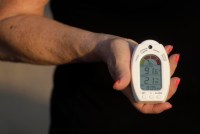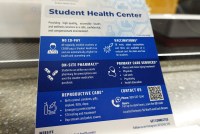Latest Morning Briefing Stories
California Fails to Adequately Help Blind and Deaf Prisoners, US Judge Rules
Thirty years after prisoners with disabilities sued and 25 years after a federal court first ordered accommodations, a judge found that California prison and parole officials still are not doing enough to help deaf and blind prisoners — in part because they are not providing readily available technology such as video recordings and laptop computers.
Dietary Choices Are Linked to Higher Rates of Preeclampsia Among Latinas
Researchers at the USC Keck School of Medicine found that Latinas who ate vegetables, fruits, and healthy oils-based foods had fewer incidences of preeclampsia. More research is needed to determine the exact diet that could be beneficial.
El tipo de alimentación está vinculado a tasas más altas de preeclampsia en latinas
No hay una forma de curar o predecir la preeclampsia. La enfermedad puede dañar el corazón y el hígado, y causar otras complicaciones tanto para la madre como para el bebé, incluido el parto prematuro e incluso la muerte.
The Horrors of TMJ: Chronic Pain, Metal Jaws, and Futile Treatments
TMJ disorders affect as many as 1 in 10 Americans and yet remain poorly understood and ineffectively treated. Many common treatments used by dentists lack scientific evidence.
Heat Protections for California Workers Are in Limbo After Newsom Abandons Rules
Proposed rules to protect millions of workers from potentially dangerous heat inside workplaces are dead after Gov. Gavin Newsom’s administration refused to sign off. Labor advocates and state regulators are calling for emergency regulations before temperatures soar this summer.
Attacks on Emergency Room Workers Prompt Debate Over Tougher Penalties
In California, assaulting paramedics or other emergency medical workers in the field carries stiffer fines and jail time than assaulting emergency room staffers. State lawmakers are considering a measure that would standardize the penalties.
California Universities Are Required to Offer Abortion Pills. Many Just Don’t Mention It.
One year after California became the first state to require public universities to provide abortion pills to students, LAist found that basic information for students to obtain the medication is often nonexistent.
Emergency Physicians Decry Surprise Air-Ambulance Bills
Emergency room doctors say insurers are increasingly declining to cover costly air-ambulance rides for critically ill patients, claiming they aren’t medically necessary. And the National Association of EMS Physicians says the No Surprises Act, enacted in 2022, is partly to blame. The law protects patients from many out-of-network medical bills by requiring insurers and providers […]
California Is Expanding Insurance Access for Teenagers Seeking Therapy on Their Own
A California law that takes effect this summer will grant minors on public insurance the ability to get mental health treatment without their parents’ consent, a privilege that their peers with private insurance have had for years. But the law has become a flashpoint in the state’s culture wars.
A Mom’s $97,000 Question: How Was Her Baby’s Air-Ambulance Ride Not Medically Necessary?
There are legal safeguards to protect patients from big bills like out-of-network air-ambulance rides. But insurers may not pay if they decide the ride wasn’t medically necessary.














